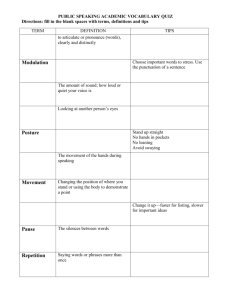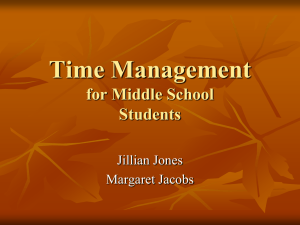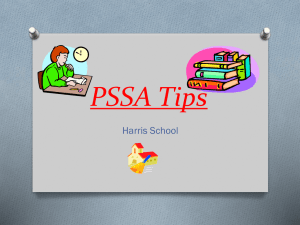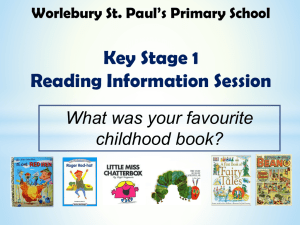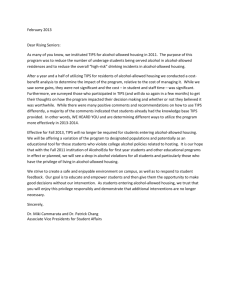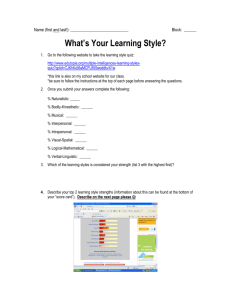PowerPoint
advertisement
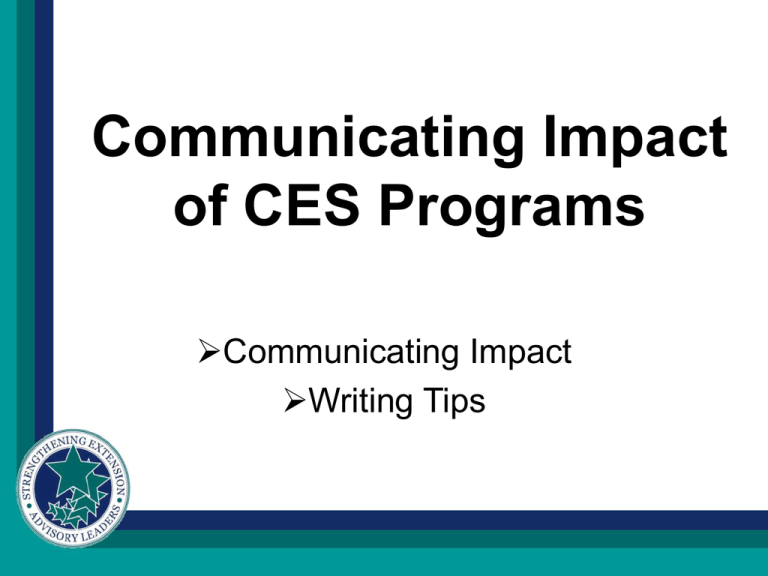
Communicating Impact of CES Programs Communicating Impact Writing Tips Objectives: • Increase the understanding Advisory Council members have on their influence of the publics perception of CES programs. • Develop skills in communicating the impact of CES programs. Neighbors – Friends - Colleagues • Part 1 – Brainstorming: Record on flip charts – Call out people you talked with about Extension. (Ex: friend, spouse, child, etc.) – Where were you when you mentioned Extension? (Ex: car, farm supply store, home, etc.) – places. Neighbors – Friends - Colleagues • Part 2 – Explore Lists: Discuss with the group. – Explore the “People List” and the “Places List.” Who might the people on the list know or be related to? Who might have overheard a comment? – Are any on the list neighbors or friends of legislators? – Do they know a legislator or elected official? – Were all comments positive? How might it influence their perception of Extension? How the Word Spreads: 10 - 10,000 10 people Who tell 10 people Reach 100 people Who tell 10 people Reach 1000 people Who tell 10 people Reach 10,000 people How the Word Spreads: 50+ 50 people Who tell 50 people Reach 2500 people Who tell 50 people Reach 125,000 people Who tell 50 people Reach 6,300,000 people How the Word Spreads: The Point • With 4 levels of contacts – 10 people can reach 10,000 OR 50 people can reach 6 million 3 R’s of Accountability • Relevance – “Why” – The educational need that led to the development of the program or educational experience – Answers the question, ”Why is this program needed?” 3 R’s of Accountability • Response – “Actions” – Shows how the Extension educator “responded” to the identified need or issue. – Answers the question, ”What did Extension do to address the need or issue?” 3 R’s of Accountability • Results – “What happened” – Communicates the outcomes of the educational program – Answers the question, ”What are the economic, social or environmental changes that resulted from these educational efforts?” 3 R’s of Accountability • As Advisory Council Leaders: – Know the programs you are sharing – ask county educators, specialists, or administrators for details and data – Your support is more valuable than a report from CES or an employee – Be able to describe: • Relevance – why the program was conducted • Response – what was done • Results – what happened Can You Find the 3 R’s • Group Activity: – Share handout with examples of impact statements – Read each example and identify sentences which describe: • Relevance • Response • Results – For each example discuss additional information that would be helpful. Points to Remember • Focus on education • Wear your taxpayer hat • Focus on results that indicate increased knowledge, changed behaviors, or added value • Write – then rewrite – practice • Make conversations systematic and intentional Writing Tips • Objectives – Learn writing tips which can improve written communication. – Develop a brief statement to share with decision-makers regarding the impact of CES programs. Say It Simply • The next four slides will present a statement that describes a common phrase. • Can you identify the phrase? Say it Simply What does it mean? In this case I have undertaken the journey here for the purpose of interring the deceased. From this point of view I do not, however, propose putting anything on record in so far as praise is concerned. I come to bury Caesar, not to praise him. Say It Simply What does it mean? Cleave gramineous matter for fodder during the period that the orb of the day is refulgent. Make hay while the sun shines. Say It Simply What does it mean? A plethora of culinary specialists vitiate the liquid in which a variety of nutritional substances have been simmered Too many cooks spoil the broth Say It Simply What does it mean? A condition characterized by tardiness is more desirable than one that is systematically marked by eternal absenteeism. Better late than never. Writing For Impact: Tips for Improving Writing Skills • Audience – Know your audience – age, gender, reading level, etc. – What does you audience know about CES? – Is the audience interested in your topic? – What will the reader want to know? – Keep your audience in mind as you write Writing For Impact: Tips for Improving Writing Skills • Audience – Audience Similarities: • Are interested in results • Want brief understandable information • Competition for their attention • Are not specialists or scientists • Have some control over programs Writing For Impact: Tips for Improving Writing Skills • Words – Less is more – Words are the tools – use the right one – Words don’t think for you – they convey YOUR thoughts – If the idea isn’t clear – words won’t clear it up – Trouble trying to put it into words – stop trying to write Writing For Impact: Tips for Improving Writing Skills • Words – Use the • Short • Simple • Personal • Specific • Colorful • Active • Familiar. . . . . . . . . . . . . . . . . . . Word Writing For Impact: Tips for Improving Writing Skills • Numbers – With statistics – make them clear • “one out of eight” – not 12 ½ percent • Analogies – “In the next five minutes, 10 people will be diagnosed with cancer.” Writing For Impact: Tips for Improving Writing Skills • Writing Numbers – Spell out numbers below 10 – use the number to express more than 10 – Spell out numbers at the beginning of a sentence, i.e., “Fifty-three people. . . Writing For Impact: Tips for Improving Writing Skills • Writing Numbers – With two or more numbers in a group, treat the sentence as a unit: • He had two suits. • He had 100 ties. • He had 100 ties, 12 shirts, 2 suits. • One or two more won’t matter. Common Grammatical Mistakes • • • • • • Too Many Prepositional Phrases Mixed Tenses Dangling Modifiers Redundancy Non-Agreement Careless Repetition Polish Your Style • Distribute Handout – In small groups rewrite the sentences. – See if you can use action verbs and eliminate words. Simple Words are Best • Distribute Worksheet • Individually (or in small groups) put a simpler word or a short phrase in the blank. You’re The Editor • • • • • Cut unnecessary words Simplify sentences Use words that are easier to understand Avoid technical jargon Avoid acronyms Clear the Fog The edited versions are much clearer, shorter and easier to understand. • Original: The discussions became quite heated at times, which was an indication that members themselves determined the goals of their club. • Better: Occasional heated discussions proved that members set their club’s goals. Clear the Fog The edited versions are much clearer, shorter and easier to understand. • Original: The horticulturalist pointed out that the homeowners in his section of town wanted nice, green lawns but weren’t willing to apply enough fertilizer to reach their goals. • Better: The horticulturist said many local homeowners won’t apply enough fertilizer to have good lawns. Clear the Fog The edited versions are much clearer, shorter and easier to understand. • Original: The essay contest is sponsored locally by the Central Electric Supply Company in cooperation with the Roberts County Extension Office. • Better: The Central Electric Supply Company and Roberts County Extension Office sponsor the essay contest. You’re The Editor • Distribute worksheet – In small groups or individually, edit the examples by eliminating words, phrases and restating SUMMARY OF KEY POINTS • You are the voice of Extension. SUMMARY OF KEY POINTS • Everything you say influences an opinion. SUMMARY OF KEY POINTS • When communicating – One size does NOT fit all. SUMMARY OF KEY POINTS • Speak for yourself. SUMMARY OF KEY POINTS • The written word – a powerful tool. SUMMARY OF KEY POINTS • Be Specific. SUMMARY OF KEY POINTS • Make it memorable – for all the RIGHT reasons!

